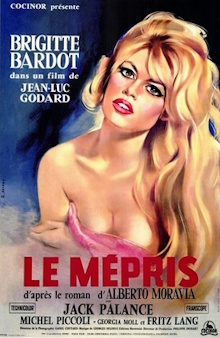I don’t think I even have a single film starring Brigitte Bardot in this blog though she’s an icon of French cinema. Here she appears in a film by Jean-Luc Godard which also includes Hollywood star Jack Palance and the famous German director Fritz Lang. This isn’t considered one of Godard’s best films but it is interesting in some ways and is easy to comprehend. As it is a film set during the filming of an adaptation of the Odyssey, the characters’ debates about their work applies directly to itself. Apart from this, there are no tricks with form and structure and so this is a relatively conventional film.
French playwright Paul Javal is invited by an American producer Jerry Prokosch to rewrite the screenplay of a troubled screen adaptation of the Odyssey. The brash and rich Prokosch is at odds with Fritz Lang, the famous director he had hired to make the film, and wants something that is more commercially palatable. Paul hesitates but Prokosch remarks that he knows he will accept as he has a beautiful wife to support and quells his doubts by writing him a fat cheque. He invites both Paul and his wife Camille to his villa. But as his sports car only carries two people, he suggests taking Camille with him and having Paul follow in a taxi. She looks to Paul to decide and he graciously agrees with Prokosch’s proposal. Delayed by a car accident enroute, Paul arrives half an hour late. He keeps asking Camille if anything had happened but she demurs. Yet back at their apartment, she seems to grow cold towards him, insisting on sleeping by herself on the couch and arguing about the project and Prokosch’s invitation to them to join him at Capri. Finally, hounded by his questions, Camille declares that she doesn’t love him any more.
Much of Godard’s work is notoriously difficult to decipher and the more recent ones even more so. By contrast, the meaning of this one is plain as day. In case you’re lost, Paul and Lang discuss the obvious parallel as they wonder why Odysseus took so long in returning to his wife Penelope after the Trojan War. They debate whether Odysseus truly loves Penelope and his attitude to the many suitors who vie for her hand during his absence. The presentation is a little awkward as Prokosch speaks only English and so has an assistant following him around to translate for him. Lang speaks both German and French and as this is set in Italy, the film crew speaks Italian. But the message is obvious even as the figures from Greek mythology are represented by enigmatic statues. Paul and Camille dance around each other with words, each unwilling to directly say what they mean, a very modern and realistic depiction of a troubled marriage. Yet it is all too obvious that it is Paul’s casual acceptance of Prokosch’s abrupt entry into their lives that sours her feelings for her husband.
This film doesn’t seem to be that highly regarded and it may have been an experiment for Godard himself. Just as Prokosch here is trying to make an adaptation of the Odyssey that is commercially viable, Godard might have been trying to strike a balance between artistry and profitability. Hiring Bardot apparently cost half of the film’s budget so the producers insisted on making the most of it by showing off her curves at every opportunity. It’s not entirely pointless as it serves to illustrate Prokosch’s implication that maintaining a beautiful wife gets expensive, but it does seem excessive. My favorite character here is actually Prokosch who seems experienced enough of a womanizer to understand that he needs to do nothing at all, that Camille and Paul’s marriage will break down as a matter of course once he is introduced into their lives.
It’s not a bad concept to turn into a film and it’s fun to see these actors interact with each other, but it does on the whole seem somewhat plain compared to Godard’s better known work. I believe Roger Ebert was correct in remarking that it was enough for Godard to try this style of film once to know that he’s not particularly good at it.
